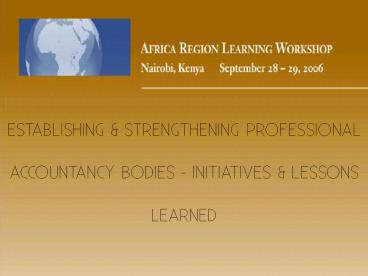ESTABLISHING - PowerPoint PPT Presentation
1 / 13
Title: ESTABLISHING
1
ESTABLISHING STRENGTHENING PROFESSIONAL
ACCOUNTANCY BODIES - INITIATIVES LESSONS
LEARNED
2
(No Transcript)
3
- The purposes of EPAAA similar with other
professional bodies. Includes
- Establish accounting and auditing standards for
its members - Issue a code of ethics
- Prescribe minimum qualifications for
professional accountants/auditors - Foster training and development
- Encourage development of accounting education
- Promote broader knowledge about the profession.
4
- As a background, in Ethiopia
- Corporate governance culture/practice weak
- Public awareness about the profession not strong
- No local stock exchange or capital market
- Exception Government Treasury Bills, financial
institutions main actors - Neither developed own accounting/auditing
standards nor official adoption - of specific national/international one for
use by business undertakings - For budgetary organizations accounting
guideline based on INTOSI in use - Commercial Code of Ethiopia of 1960 specific
authority governing profession connected
with businesses - Proclamation 57/96 applies to budgetary
organizations - Statutory audit a requirement for public
enterprises, NGOs in general and
associations - Two categories of incorporated business
undertakings
5
- - Share Companies all require statutory
audits with capital as low as
Birr 50,000.- (Approximately US5,700.-) - - Private Limited Companies if
only number of members gt20
though most common form and with multi-million
Birr capital/net assets. - ? Audit Services Corporation established
by previous Government in 1978
empowered by special legislation to undertake
audits of Govt business
undertakings - Private auditors require certificate of
competence. - ? Concerning education, many private colleges
immerging. Adequacy of curriculum to
assist professional development skills
considered questionable - ? Impact of IT on accounting, processing and
being attractive to trainees already
being felt.
6
- Actual existing operating structure and mandate
- EPAAA not a regulatory/qualifying body with
legislative backing - Unable to issue standards, license and monitor
activities of Members - This mandate granted to Office of the Federal
Auditor General (OFAG) - A Government body also responsible basically
for budgetary audits - EPAAA remains a "voluntary club"
- Only one full time clerk/secretary
- Main sources of finance membership
- Recently Joint Examination Scheme with ACCA
augmenting
7
- Adoption of international standards
- For many years GAAP/GAAS referred as the basis,
not identified with specific country - Recently some reports making references to
IFRS/ISAs - Necessary structure not in place in terms of
realistic compliance - Cause for concern for EPAAA to preserve
credibility of local audit - EPAAA undertook independent study by ACCA
giving us 'Road Map' - Attempts being made to implement same
- ECSAFA's SME Guide shared with OFAG, considered
good input. - Structure of SMEGAs by UNCTAD being considered.
8
(No Transcript)
9
- Challenges lessons learned
- Enabling legislative backing required for EPAAA
like its peers even to fulfill stated
mandates - Membership to EPAAA and certification by OFAG
not by local exams - Cost/inadequate training centers and low of
qualified accountants - About 10 a decade ago, later increased to 50
and currently 180 (some out of Country) - Only 45 members of EPAAA as voluntary, not
requirement for license - Some considering the fees prohibitive and
unable to attract volunteers - Of those enrolled, limited number paying their
fees - Audit remains voluntary for most large business
undertakings - Revised Commercial Code hoped to tackle this
- Limited contribution of profession to economic
development
10
- By enhancing credibility of financial
statements and investor confidence - Reliance on audit reports limited. Expectation
gaps, below standard work - Contracting audit services-
- - Victim of inflexible competitive
bidding, initially by Gov't - - Quantitative factors (fees and stated
completion time frame) only criteria - - Fear for being answerable, or no
appreciation about profession
11
- - Appointment not free from influence of
executive body - - Current level of fees inadequate to improve
quality services and long- term
professional developments - - Not conducive for competing for the provision
of quality services - - Sometimes working to the detriment of audit
independence. - EPAAA's statutes about 34 years old, requiring
revision to reflect current thinking and
realities on ground - Accommodating the needs of profession and
authorities a challenge - Use of Audit Committees, at least for larger
organizations to come - EPAAA "toothless" even to discipline/monitor
activities of its Members - OFAG issued a Code of Ethics in 2004 yet to be
operational
12
- Without such activities by OFAG and/or EPAAA,
provision of professional services of up to
the expected standard mostly tends to be left
to individual practitioners - Weak institutional/technical capacity at
OFAG/EPAAA - Shortage of finance at EPAAA critical. Unable
to participate in most workshops by ECSAFA - Without sponsorship, would not have been here
13
- In view of above, EPAAA and the profession in
general are relatively old but still a long
way from being strong and effective. Growth and
adoption of full-blown international
standards remain to be a challenge.































